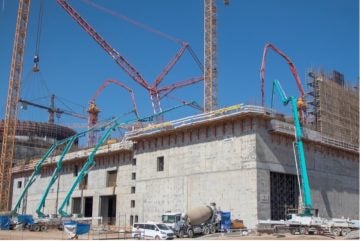
Russian and Turkish builders at the Akkuyu NPP under construction by Rosatom in Türkiye have completed concreting the foundation of the turbine set for unit 3. The foundation is able to withstand and evenly distribute the heavy loads generated during turbine operation. A spatial reinforcement frame with dimensions of 58.2 metres by 20.4 metres and a height of 5.3 metres was constructed. It consists of horizontal and vertical high-strength steel rods with diameters ranging from 8 to 36 mm, connected to each other by threaded couplers.
Project company Akkuyu Nukleer said, due to the high processability and convenience of working with the couplers, it was possible to achieve a significant reduction in installation time and labour costs. In total, more than 307 tonnes of reinforcement steel was placed in the foundation. In addition, the foundation structure incorporates process penetrations and embedded parts weighing a total of 70 tonnes.
“Using a continuous concreting technique, 2,220 cubic metres of high-strength self-compacting concrete was placed in the foundation structure of the complex geometric shape. The maturing period will be 56 days. During this time there will be monitoring and steam curing, especially important to ensure high quality of the massive foundation structure,” said Sergei Butskikh, CEO of Akkuyu Nukleer. Once the concrete slab has reached its design strength, Akkuyu NPP engineers will start full-scale work on installation of the turbine-generator plant.
Akkuyu, Türkiye’s first NPP, will eventually host four Russian-designed VVER-1200 reactors. The pouring of first concrete for unit 1 took place in April 2018, for unit 2 in June 2020, for unit 3 in March 2021, and for unit 4 in July 2022. Rosatom is constructing the reactors according to a build-own-operate model. Unit 1 is expected to begin operation in 2025. In July Akkuyu NPP reported that some 70% of the equipment and systems installed at unit 1 had already undergone commissioning.
Meanwhile, the Akkuyu construction site was visited by a delegation of energy industry leaders from Türkiye headed by Minister of Energy & Natural Resources Alparslan Bayraktar. The delegation included Deputy Minister of Energy Zafer Demirjan, second chairman of the Turkish Nuclear Regulatory Agency Ismail Hakky Arykan, head of the Main Directorate of Nuclear Energy and International Projects of the Ministry of Energy and Natural Resources of Turkey Yusuf Jaylan, as well as heads of other departments for nuclear energy.
The delegation at the site was received by the chairman of the board of directors of Akkuyu Nukleer Anton Dedusenko and the general director of the company Sergey Butskikh. They briefed the Tuekish delegation about the progress in commissioning unit 1 and the construction and installation work underway at the other units.
The delegation examined the reactor department of the first power unit, where pre-launch commissioning is currently underway as well as the observation deck with panoramic views over the site.
Minister Bayraktar noted that Akkuyu was the largest nuclear construction project in the world with more than 34,000 workers on site. “ At unit 1 full-scale commissioning is continuing. On units 2, 3 and 4, which are planned to be put into operation at intervals of one year after the launch of unit 1, work is on schedule,” he said.
Dedusenko emphasised that the Akkuyu project represents a close partnership between Russia and Türkiye in the field of nuclear energy which will last for many years as the life cycle of a modern NPP is more than 100 years. “At all stages of the project, Turkish specialists work and will work in a single team with Russian colleagues. We are now at the final stage of preparation for the start of operation of unit 1, and this stage requires maximum involvement of all parties as the main priority for us is reliability and safety.”
Commissioning of unit 1 is planned for 2025 and earlier the Turkish authorities named 29th October as the date. However, they subsequently reported that due to problems with the supply of equipment from Germany, this could be postponed to a later time.






